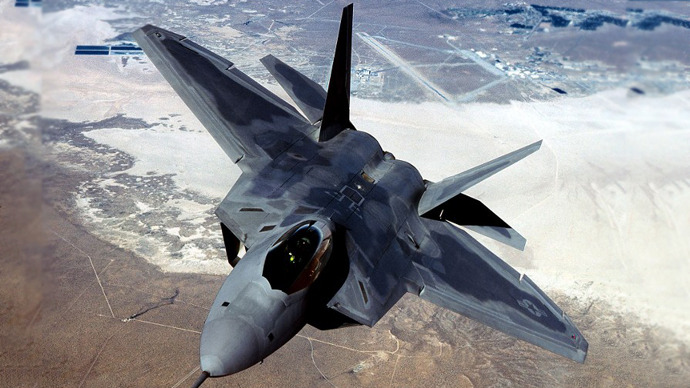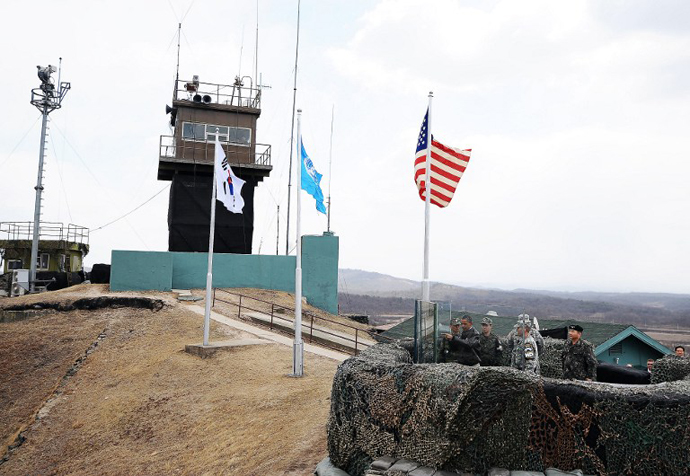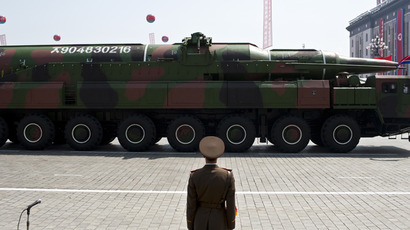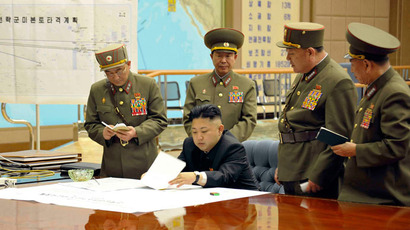South Korea vows ‘strong response’ to attack from North, as US boosts military presence off peninsula

South Korea has changed its rules of engagement ordering its troops to immediately respond to provocations from the North. Following the deployment of F-22 stealth fighters, the US has now sent a destroyer into Korean coastal waters.
On Monday, the South Korean president warned that the country’s
military has been ordered to strike back without waiting for
permission from Seoul in the event of any attack from the North.
"If there is any provocation against South Korea and its people,
there should be a strong response in initial combat without any
political considerations," Park Geun-hye, South Korean
President, is cited as saying by Reuters.
While the Korean Peninsula is now in a “state of war” announced by
Pyongyang and the country’s ballistic rockets are allegedly
targeting American bases in the region and even the US mainland,
the US has decided to continue its military drills with South Korea
as planned.
The White House issued a statement saying that the US takes seriously North Korea's war threats, but at the same time it is not seeing “large-scale mobilizations and positioning of forces” by Pyongyang, “despite the harsh rhetoric.”
The USS Fitzgerald, positioned next to North Korea, will serve
to shoot down any missiles launched from the country. It is the
latest move in a rapidly escalating confrontation with the
communist state. The vessel was initially supposed to return to
base in Japan following recent joint exercises with the South,
according to a US defense official.
Speaking on condition of anonymity, the official told AFP the
re-positioning of the USS Fitzgerald was a “prudent move”
aimed at providing “greater missile defense options,
should that become necessary.”
The advanced radar-evading F-22 Raptors were redeployed from Kadena Air Base in Okinawa to the Osan Air Base, the main US base in South Korea.
“North Korea will achieve nothing by threats or provocations, which will only further isolate North Korea and undermine international efforts to ensure peace and stability in Northeast Asia,” the statement from the US military command said.
The American military did not specify the number of fighting units that were re-deployed. The repositioning of force, the army claims, follows routine shifts among US bases in the Western Pacific since 2004.

The relocation of the F-22 fighters follows earlier US displays of air dominance in the region, including the mock bombing of South Korea staged by B-52 bombers and B-2 stealth bombers.
US command in S. Korea explained earlier this month that, “despite challenges with fiscal constraints, training opportunities remain important to ensure US forces are battle-ready and trained to employ airpower to deter aggression, defend the ROK and defeat any attack against the alliance.”
Earlier on Sunday, North Korea vowed to boost its nuclear arsenal, a “treasure of a reunified country” which it will never trade for “billions of dollars” worth of aid.
The annual US-South Korean military exercise has angered North Korea, especially after US showcased it’s most advanced capabilities, including the the B-2 stealth bomber. In retaliation, the North threatened to “blow up US bases for aggression in its mainland and in the Pacific operational theatres including Hawaii and Guam.”
The threat to the peninsula peace worsened when on Saturday North Korea announced that any issues between the two countries will be resolved in a "wartime manner" and the country's leader, Kim Jong-un, threatened to close the border factory complex, a major source of exchange between two hostile neighbors. The two Koreas have formally been at war since fighting ended in the 1950-53 conflict as a peace agreement was never signed.














